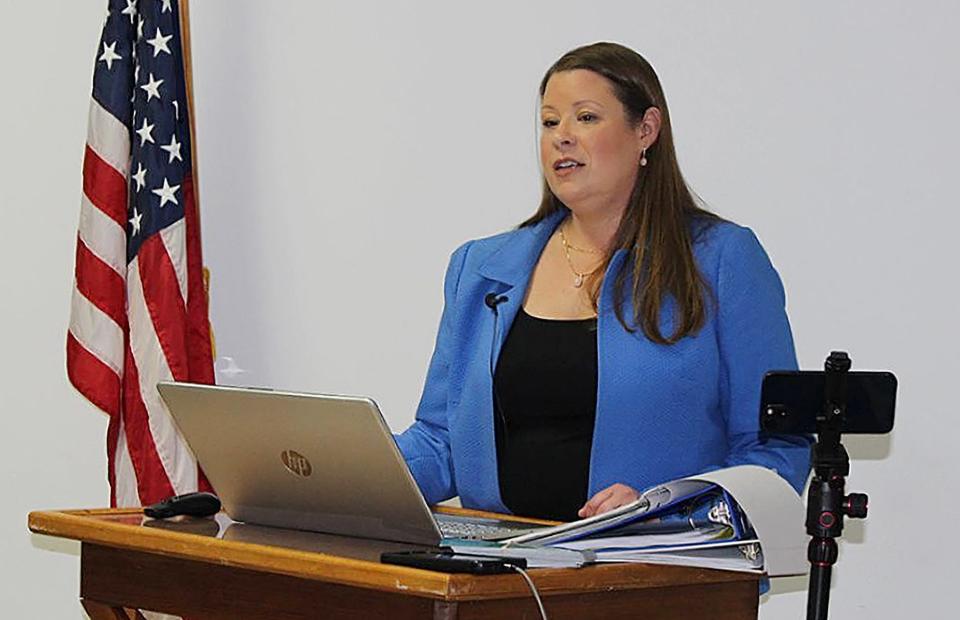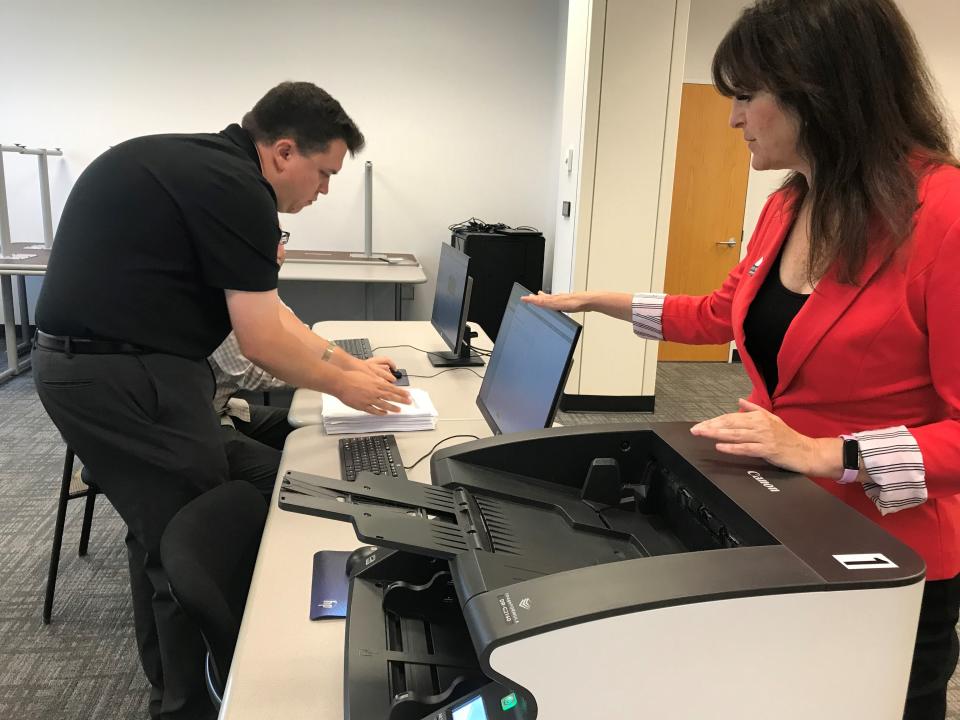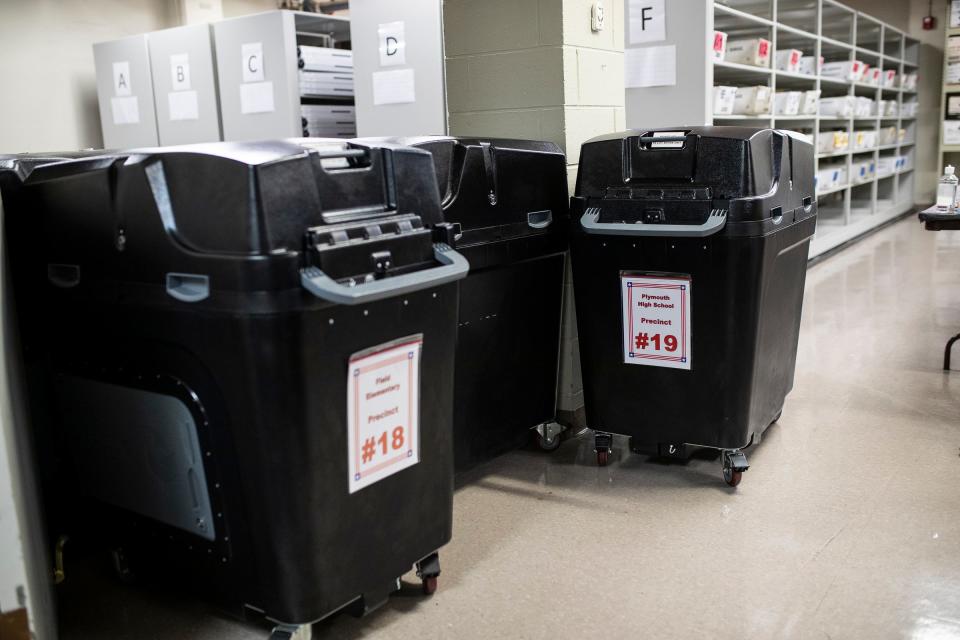Did data from Georgia voting machine breach play role in alleged Michigan election plot?
A drive containing data from voting equipment in Georgia was shipped to an investigator probing the 2020 election who seized five ballot tabulators in Michigan for a pro-Trump lawyer, according to court testimony and documents reviewed by the Free Press.
The court records raise questions about how data from a voting system breach in Georgia cited in the recent indictment of former President Donald Trump and his allies may have assisted experiments carried out on Michigan voting machines as part of an alleged criminal conspiracy. Separate criminal cases alleging voting equipment-related offenses in the two 2020 battleground states may reveal new connections between efforts to scrutinize the machines Americans rely on to count their votes.
Michigan lawyer Stefanie Lambert was "at the center" of an alleged scheme to illegally obtain Michigan voting machines, according to special prosecutor DJ Hilson who convened the grand jury that charged her and others. Lambert has pleaded not guilty.

She coordinated with others — including an individual named Michael Lynch from Royal Oak — to carry out an investigation of the 2020 election, according to prosecutors. Lynch does not face criminal charges related to seizing voting machines. Lynch has been a licensed private investigator since 2008, according to Michigan's Department of Licensing and Regulatory Affairs.
According to reporting from the Hastings Banner, an individual named Michael Lynch previously worked as a security officer for DTE Energy before Lambert recommended him to Barry County Sheriff Dar Leaf to work as a private investigator for Leaf's 2020 election probe. A spokesperson for DTE Energy confirmed that Lynch worked as director and chief security officer and left the company in December 2018.
As part of Lambert's alleged plan targeting voting machines, Lynch traveled across Michigan to obtain five voting machines, according to prosecutors.
A Michigan voting machine journey
In March 2021, Lambert directed Lynch to go to Missaukee and Roscommon counties, where he got his hands on four tabulators, according to prosecutors. He obtained a fifth tabulator at an unspecified later date from Barry County.

Lynch brought all five tabulators back to Oakland County, where purported technology experts examined and tampered with the machines, prosecutors say. His Royal Oak condominium served as the set for a professional filming of some of the testing on one of the tabulators Lynch illegally obtained, according to prosecutors.
That's where a shipment appearing to contain a data drive from a Coffee County, Georgia, breach was sent, according to court records. A federal lawsuit in Georgia uncovered the Coffee County breach before a grand jury in the state brought charges against Misty Hampton, the former elections director in the county indicted for allegedly working with unauthorized individuals to extract data from voting equipment.
Lambert worked as Hampton's lawyer as recently as last November, according to a deposition Hampton gave in the Georgia civil lawsuit.
The shipment from the Peach State to Royal Oak seems to tie together the alleged criminal voting equipment breaches carried out in two key states Trump lost in 2020. Lambert did not respond to questions from the Free Press about a shipment from Georgia and how data from Georgia may have been used to examine Michigan voting machines. Lynch declined to comment.
A FedEx from Georgia to Michigan
Lynch returned the Roscommon County tabulator in early April 2021, but he didn't return the others — including the one filmed in the video recorded at his condo — for months, according to prosecutors. Before he returned the machines, a package that appeared to contain the Georgia data was shipped to his condo.

Court records from the Georgia civil lawsuit reference an email from one of the computer experts who allegedly experimented on the Michigan machines. On April 22, 2021, he emailed a top officer of forensics firm SullivanStrickler that worked with Trump allies after the 2020 election to request a FedEx shipment of "all the forensics material from the Coffee County acquisition to the same address as before," according to a court deposition in the Georgia civil suit.
The officer for SullivanStrickler wrote back, "we will begin the process of copying everything to a drive."
Court records from that lawsuit reference a shipment addressed to Lambert at a Royal Oak address associated with Lynch, according to a declaration from Kevin Skoglund, an expert for the plaintiffs in the Georgia civil suit. Separate testimony also referenced a shipment from Georgia to Lambert at a Royal Oak address and identified Lynch as a private investigator working for Lambert. The Washington Post first reported on the email exchange.
Who is 'unindicted co-conspirator Individual 30'?
The Georgia grand jury indictment against Trump and his allies appears to mention an email exchange about the shipment.
It references an April 22, 2021, email to SullivanStrickler's chief operations officer requesting the transmission of data copied from voting equipment in Coffee County to an unidentified and "unindicted co-conspirator Individual 30" described only as a lawyer associated with Sidney Powell and the Trump campaign.

Powell and Lambert worked together in a federal lawsuit in Michigan to overturn the election. It is unclear whether Lambert had any kind of formal employment relationship with the Trump campaign.
The Georgia grand jury indictment alleges those charged and their unindicted co-conspirators were part of a criminal enterprise operating in Georgia, Michigan and other key states in 2020 that attempted to change the outcome of the election.
Contact Clara Hendrickson: chendrickson@freepress.com or 313-296-5743. Follow her on Twitter @clarajanehen.
This article originally appeared on Detroit Free Press: A Michigan and Georgia voting machine breach connection?


